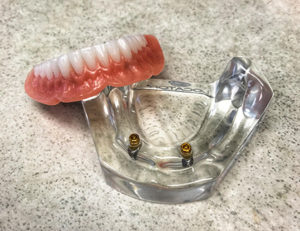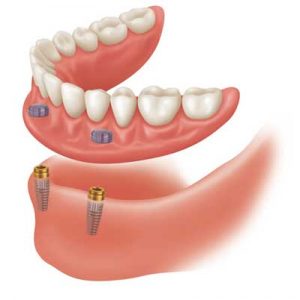
What Are Snap-In Dentures?
Snap-in dentures, also known as implant-supported dentures, are a type of denture that uses dental implants for added stability. Unlike traditional dentures, which rest on the gums and can sometimes slip or cause discomfort, snap-in dentures attach to implants secured in the jawbone. This provides a more secure fit, making them a popular choice for individuals looking to replace missing teeth with a solution that feels more like natural teeth.
These dentures are designed to offer a more comfortable and functional solution compared to traditional dentures. However, they are not permanent and must be removed regularly for cleaning and maintenance. Snap-in dentures can significantly improve the quality of life for those with missing teeth, but they do require a commitment to proper care and regular dental visits to ensure their longevity and effectiveness.
Problems With Snap-In Dentures
While snap-in dentures offer several benefits, they are not without their challenges. Understanding these common problems can help individuals navigate them and ensure a comfortable and functional smile.
Fragility and Breakage
Snap-in dentures are more fragile than traditional dentures, particularly around the implant area. The design of snap-in dentures tends to be finer and more delicate, making them prone to breakage. Denture cracks and breaks can occur if the denture is not handled carefully or if the implants are not properly secured. Regular checks and gentle handling are essential to prolong the lifespan of snap-in dentures. It’s important to follow your dentist’s advice on how to care for and handle your dentures to avoid unnecessary damage.
Maintenance and Wear
Proper maintenance is crucial for the longevity of snap-in dentures. The implants used in snap-on dentures can accumulate plaque and calculus over time, leading to the growth of harmful bacteria if not cleaned regularly. Brushing the implants with a soft toothbrush and visiting a dentist regularly can help prevent these issues. Additionally, the snaps that secure the dentures to the implants can wear out over time, leading to a loose fit and reduced functionality. Regular dental visits can help identify and address these issues before they become significant problems.
Chewing Efficiency and Bone Loss
Snap-in dentures may not provide the same chewing efficiency as natural teeth or dental implants with permanent teeth. This limitation can affect dietary choices and overall satisfaction with the dentures. Furthermore, ongoing bone loss can occur in areas without implants, affecting the stability of the dentures and posing long-term issues for oral health. Regular dental check-ups are essential to monitor bone loss and ensure the dentures continue to provide comfort and functionality. Your dentist can offer solutions to mitigate bone loss and improve the fit and function of your dentures over time.
By understanding these common problems with snap-in dentures, you can take proactive steps to address them and maintain a healthy, functional smile. Regular dental visits and proper care are key to ensuring the longevity and effectiveness of your snap-in dentures.
Snap-on dentures, also known as overdentures, are a popular option for replacing missing teeth.
They are removable dentures that attach to remaining teeth or dental implants, providing a secure and comfortable fit. Unlike snap-in dentures, which require regular maintenance and can wear out over time, dental implants offer a more permanent and durable solution.
While snap-on dentures can offer many benefits, some people may have concerns or questions about this dental solution. In this article, we will discuss some common concerns about snap-on dentures and provide information to help alleviate any worries. Dental professionals play a crucial role in identifying and managing common problems with snap-on dentures, ensuring their effectiveness and enhancing patient satisfaction.
Frequently Asked Questions About Problems with Snap-In Dentures
- Will Snap-On Dentures Stay in Place? One of the most common concerns about snap-on dentures is whether they will stay in place while eating or speaking. Snap-on dentures are designed to provide a secure fit, but there may be some movement, especially during the first few weeks of adjustment. It is important to follow the care instructions provided by your dentist, such as using denture adhesive, to help keep your dentures in place. Over time, you should become more comfortable with your snap-on dentures and experience less movement. Due to potential fit issues over time, frequent adjustments may be necessary to ensure they remain functional and comfortable. Unlike snap-in dentures, dental implants do not require frequent adjustments and provide a more stable fit over time.
- Will Snap-On Dentures Cause Irritation or Sores? Some people worry that snap-on dentures will cause irritation or sores on their gums. While it is possible to experience some discomfort or irritation during the initial adjustment period, snap-on dentures should not cause significant pain or sores. If you experience persistent discomfort, you should consult your dentist, who may adjust the fit or recommend an alternative solution. Gum soreness can also occur if the dentures are not fitted correctly, so regular check-ups are important to mitigate this problem.
- Can Snap-On Dentures Affect Speech? Snap-on dentures may affect speech during the adjustment period, as you get used to speaking with the new appliance in your mouth. However, with practice and time, most people are able to speak clearly with snap-on dentures. If you continue to experience difficulty with speech, your dentist may make adjustments to the denture or provide speech therapy to help you improve your speaking abilities.
- How Long Will Snap-On Dentures Last? Snap-on dentures can last for several years with proper care and maintenance. However, the lifespan of your dentures will depend on various factors, such as the quality of the materials used and your oral hygiene habits. You should schedule regular check-ups with your dentist to monitor the condition of your snap-on dentures and ensure they are functioning properly. Denture cracks can occur, particularly at the implant site, so handle your dentures with care to prevent breakage. Additionally, snaps wear over time and may need regular replacements every six to twelve months.
- How Do I Clean Snap-On Dentures?Cleaning these dentures is essential for maintaining good oral hygiene and preventing the buildup of bacteria and plaque. Your dentist will provide instructions on how to clean your snap-on dentures, which may include using a denture brush and soaking solution. It is important to avoid using hot water or abrasive cleaners, as they can damage the denture. Problems with snap, such as maintenance challenges and reduced chewing efficiency, can arise, so understanding these issues is crucial for proper care.
- How Much Do Snap-On Dentures Cost? The cost of snap-on dentures will depend on various factors, such as the materials used, the number of teeth being replaced, and your insurance coverage. In general, these dentures may be less expensive than traditional implant-supported dentures, but they can still be a significant investment. While the initial cost of snap-on dentures may be lower, it’s important to consider ongoing maintenance costs. Snap-on dentures are an effective tooth replacement solution, but comparing them with other options like dental implants can help you make an informed decision. Your dentist can provide a detailed cost estimate and discuss financing options that may be available to you.
Finding A Qualified Dentist for Snap-In Dentures
In conclusion, snap-on dentures can be a comfortable and effective solution for replacing missing teeth. While it is natural to have concerns or questions about this dental option, understanding the benefits and potential challenges can help you make an informed decision about your dental care.
If you are considering snap-on dentures, schedule a consultation with a qualified dentist who can answer your questions and provide personalized recommendations for your oral health needs. Additionally, fixed dentures are another alternative to consider, and a professional can help you choose the right type of dentures for your specific situation.


